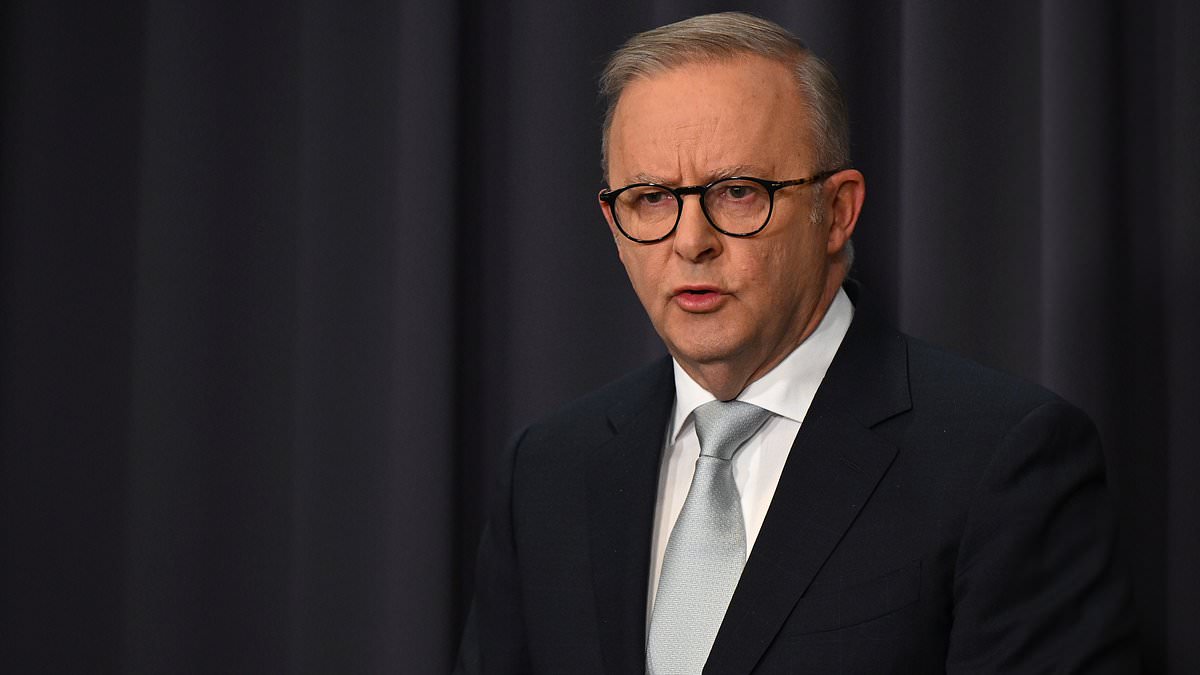Anthony Albanese has revealed that was not given advance warning of Donald Trump’s decision to ‘obliterate’ Iran’s nuclear facilities, as the Prime Minister belatedly backed the US decision.
Albanese fronted the media shortly after 11.30am on Monday – more than 24 hours after the US President unleashed a series of ‘bunker bombs’ on three of Iran’s nuclear sites in a serious escalation of the conflict raging in the Middle East.
But after a short statement and a terse back-and-forth with reporters, the Prime Minister brought the press conference to an abrupt end after just nine minutes.
It came after a government spokesperson failed to endorse the US attack on Sunday, with Foreign Minister Penny Wong eventually stating on Monday that the government backed Trump’s call.
The Prime Minister was asked why it had taken so long to give his backing to the move by ‘s top security ally against the Islamic Republic’s nuclear capabilities.
‘We aren’t a central player in this conflict, that’s just a fact,’ he responded.
‘What we do is we run an orderly, stable government. But I made comments about this in three countries over recent days. My comments today are perfectly consistent with that.’
Albanese was repeatedly asked whether was told of the strikes or whether it had given any assistance – military or otherwise – to the US but gave the same response each time.
‘This was a unilateral action taken by the United States,’ he insisted.
n facilities – such as the Pine Gap signals intelligence base near Alice Springs, and the Harold Holt naval communication station in ‘s north-west – often provide assistance to US military operations.
UK Prime Minister Keir Starmer revealed he was told of the military action in advance.
Albanese also admitted that he had had no contact with Trump since the US President left the G7 summit in Canada early last week to deal with the deepening crisis in Iran.
After being criticised for initially not supporting the strikes, the PM sought to make it clear that backed its largest ally.
‘The world has long agreed that Iran cannot be allowed to get a nuclear weapon and we support action to prevent that – that is what this is,’ Albanese told reporters.
‘The US action was directed at specific sites central to Iran’s nuclear program. We don’t want escalation and a full-scale war. We continue to call for dialogue and for diplomacy.’
Albanese said that if Iran had complied with restrictions imposed by the global nuclear watchdog, the US might not have attacked.
‘Had Iran complied with the very reasonable requests that were made, including by the IAEA (International Atomic Energy Agency), then circumstances would have been different,’ he said.
But he was in no doubt that the Islamic regime was trying to build a nuclear weapon.
‘The information has been clear that Iran has sought to increase the grade … there’s no other explanation for it to reach 60 (per cent) other than engaging in a program that wasn’t about civilian nuclear power,’ he said.
He urged the theocracy ‘not to take any further action that could destabilise the region’.
Former prime minister Scott Morrison slammed Albanese for failing to speak publicly in the 24 hours after the US strike on Iranian nuclear facilities.
‘We’ve heard from (UK Prime Minister) Keir Starmer, we’ve heard from (French President) Emmanuel Macron, we’ve heard from many,’ Morrison told 2GB on Monday morning.
‘I think it’s very important that makes it very clear where we stand.
‘I think on the Middle East issue more broadly, particularly going back to October 7th, there’s been an absolute fog of ambiguity when it comes to where the government stands on this issue, and in this case, particularly with our strongest ally.
